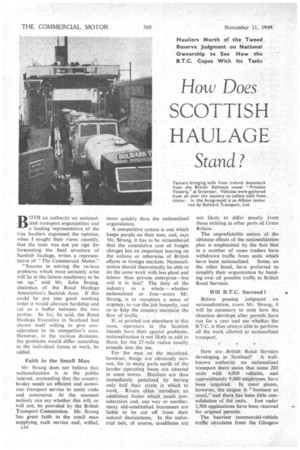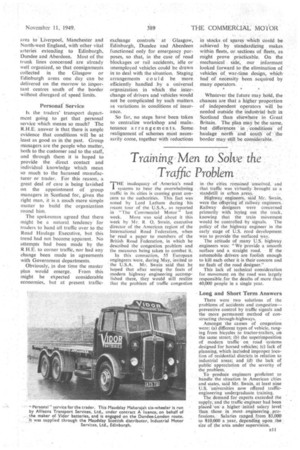How Does SCOTTISH HAULAGE Stand?
Page 88

Page 89

If you've noticed an error in this article please click here to report it so we can fix it.
BOTH an authority on nationalized transport organization and a leading representative of the free hauliers expressed the opinion, when I sought their views recently, that the time was not yet ripe for forecasting the final structure of Scottish haulage, writes a representative of The Commercial Motor."
"Success in solving the various problems which must certainly arise will lie in the liaison machinery to be set up," said Mr. John Strang, chairman of the Road Haulage Association's Scottish Area. If this could be put into good working order. it would alleviate hardship and act as a buffer between the two parties. So far, he said, the Road Haulage Executive in Scotland had shown itself willing to give consideration to its competitor's case. However, in the various divisions, the problems would differ according to the individual forces •at work, he added.
Faith in the Small Man Mr. Strang does not believe that nationalization is in the public interest, contending that the country • to-day needs an efficient and economic transport service to assist trade and commerce. At the moment nobody can say whether this will, or will not, be provided by the British Transport Commission. Mr. Strang has great faith in the small man supplying such service and, withal, t.i0 more quickly than the nationalized organization.
A competitive system is one which keeps people on their toes, and, says Mr. Strang, it has to be remembered that the cumulative cost of freight charges has an important bearing on the sutcess or otherwise of British efforts in foreign markets. Nationalization should theoretically be able to do the same work with less plant and labour than private enterprise—hut will it in fact? The duty of the industry as a whole— whether nationalized or free—avers Mr. Strang, is to recapture a sense of urgency, to run the job honestly, and soto help the country maintain the flow of traffic.
If, as pointed out elsewhere in this issue, operators in the Scottish islands have their special problems. nationalization is not likely to add to them, for the 25-mile radius usually extends into the sea. .
For the man on the mainland, however, things are obviously serious, for in many Darts north of the border operating bases are situated in coast towns. Habliers are 'thus immediately penalized, by having only half their circle in which to work. Rivers often introduce, an additional factor which needs con-fl sideration and, one way or another, many old-established businesses are liable to be cut off from their natural destinations. In the industrial belt, of course, conditions are
not likely to differ greatly from those existing in other parts of Great Britain., .
The unpredictable nature of the ultimate effects of the nationalization plan is emphasized by the fact that in 'a number of cases traders have withdrawn traffic from units which have been nationalized. Some, on the other hand, have preferred to simplify their organization by handing over all possible traffic to British Road Services.
Will B.T.C. Succeed?
Before passing judgment on nationalization. avers Mr. Strang, it will be necessary to note how the situation develops after permits have run for a year and see whether the B.T.C. is then always able to perform all the work allotted to nationalized transport.
How areBritish Road Services developing hi Scotland? A wellknown authority on nationalized transport there states that some 200 units with 4,000 vehicles, and approximately 9,000 employees, have been acquired. In most places, however, the slogan is "business as usual," and there has been little con solidation of the units. Just under 1,500 applications have been received for original permits.
The heaviest commercial-vehicle traffic circulates from the Glasgow area to Liverpool, Manchester and North-west England, with other vital arteries extending to Edinburgh, Dundee and Aberdeen. Most of the trunk lines concerned are already well organized, so that consignments collected in the Glasgow or Edinburgh areas one day can be delivered on the morrow to important centres south of the border without disregard of speed limits.
Personal Service
Is the traders' transport department going to get that personal service which means so much? The R.H.E. answer is that there is ample evidence that conditions will be at least as good as in the past. Group managers are the people who matter, both to the customer and to the staff, and through them it is hoped to provide the direct contact and individual knowledge which mean so much to the harassed manufacturer or trader. For this reason, a great deal of care is being lavished on the appointment of group managers in Scotland for, given the right man, it is a much more simple matter to build the organization round him.
The spokesman agreed that there might be a natural tendency for traders to hand all traffic over to thc Road Haulage Executive, but this trend had not become apparent. No attempts had been made by the RILE. to corner traffic, nor had any change been made in agreements with Government departments.
Obviously, in due time the master plan would emerge. From this might be expected considerable economies, but at present traffic
exchange controls at Glasgow, Edinburgh, Dundee and Aberdeen functioned only for emergency purposes, so that, in the case of road blockages or rail accidents, idle or unemployed vehicles could be drawn in to deal with the situation. Staging arrangements could be more efficiently handled _by a universal organization in which the interchange of drivers and vehicles would not be complicated by Such matters_ as variations in conditions of insurance.
So far, no steps have been taken to centralize workshop and main-. tenance arrangements. Some realignment of schemes must necessarily come, together with reductions
in stocks of spares which could be achieVed by standardizing makes within fleets, or sections of fleets, as might prove practicable. On the mechanical side, our informant looked forward to the elimination of vehicles of war-time design, which had of necessity been acquired by many operators.
Whatever the future may hold, the chances are that a higher proportion of independent operators will be needed outside the industrial belt in Scotland than elsewhere in Great Britain. The Dian may be the same, but differences in conditions of haulage north and smith of the border may still be considerable.
































































































































































































